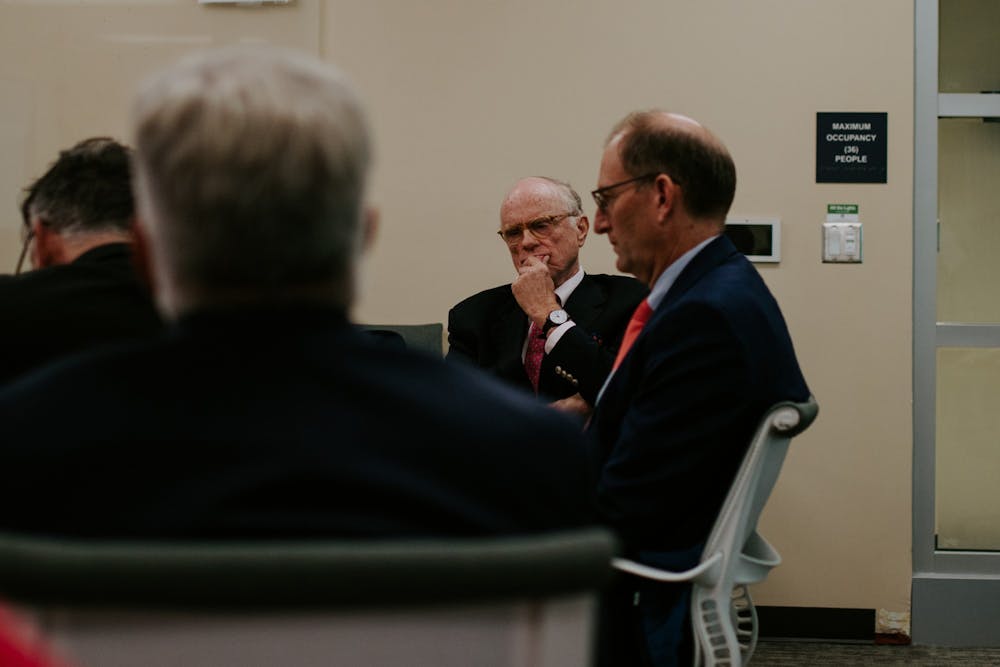The Board of Visitors Finance Committee approved a $5.4 billion budget for the University’s Academic Division, Medical Center and the College at Wise during its meeting Friday. The fiscal year’s budget, which begins July 1, accounts for 5 percent pay increases for faculty and staff. The Board also reduced tuition increases for in-state undergraduate students from a 3.7 percent increase to a 3 percent increase following a request from the Virginia Secretary of Education.
J.J. Davis, executive vice president and chief operating officer of the University, presented the University’s proposed budget for the 2023-2024 fiscal year to the Board despite not yet receiving a budget from the state that should have been finalized in March. The Virginia General Assembly concluded its February meeting with no agreement on the state budget, leaving the University to make allocation assumptions based on last year’s biennium budget.
The total $5.4 billion budget includes $2.3 billion allocated to the Academic Division, $3 billion to the Medical Center and $71.7 million to the College at Wise. This budget allocates $620 million more to the 2023-24 fiscal year compared to the 2022-23 fiscal year, which had a $4.78 billion budget.
$3 billion of the total annual budget is allocated towards personnel related costs, including salary and benefits.
Davis identified a 5 percent pay increase for all faculty and staff as a key area of focus for the University to reach a top 20 faculty salary ranking from the Association of American Universities — a goal that the Board committed to in 2013 to achieve by 2017.
“I am here to say unfortunately, we have not met that goal,” Davis said. “as of today we are ranked 27 and the aspirational goal is to be 20. We continue to strive for it. The 5 percent increase this year should move us closer.”
Ian Baucom, executive vice president and University provost, said that the pay increases for faculty and staff will also help the University recruit and retain more faculty. During a Board of Visitors meeting in March, Davis stated that the University faces a so-called “war for talent” with high vacancy rates among faculty and staff and other universities offering more competitive salaries. During Friday’s meeting, Baucom reaffirmed the presence of this “war for talent” at the University.
“If I take a look at that list in terms of which of those institutions are we competing with faculty, it’s all of them,” Baucom said. “And not only we’re trying to recruit their faculties, they’re coming after ours.”
Davis explained that the cost of salary increases, expected to be over $60 million, puts financial pressure on the University to balance increased salary with student tuitions, but she hopes to receive $11 million from the state to help finance these pay increases.
During Friday’s meeting the Board also voted to change the percent increase for in-state undergraduate students from 3.7 percent to 3 percent. In Dec 2021, the Board approved a 3.7 percent increase for all undergraduate students, but Virginia Secretary of Education Aimee Guidera sent Board members a letter in early May 2023, asking for a tuition increase of no more than 3 percent.
“We believe it’s a good faith effort to try to be responsive to the administration’s request while balancing out our ability to meet our financial needs in the coming year,” Davis said.
This change to student tuition by the Board of Visitors comes later in their budgetary cycle than normal, as the finance committee usually addresses tuition for the next academic year during its December meeting.
Board member Amanda Pillion commended Davis for responding to Guidera’s request and working to make the University affordable for students.
“It is very difficult to balance making sure that every child in Virginia has the financial opportunity to attend this institution that we're so proud of while still providing them with everything that they need,” Pillion said. “From a parent's perspective. . . you've done a great job.”
This change in tuition costs for in-state undergraduate students will result in a $1.3 million loss in revenue from tuition, based on projections from the incoming University class.
Other actions by the Finance Committee included approving a tuition increase for the College at Wise’s new Masters of Education program to a total of $464 per credit hour and approving a strategic affiliation with the U.Va. Medical Center.
While the Medical Center has the legal capacity to operate independently from the University, it signed a nonbinding letter of intent with the University to commit to U.Va. Health’s 10-year “One Future Together, Health and Hope for All” strategic plan. With the Board’s approval, the University can execute the final terms of the collaboration between the Medical Center and U.Va. Health, which Davis anticipates to happen in early July.
The Finance Committee also voted to pre-approve a debt shelf registration of an undetermined amount for the University over the next three to four years. This debt shelf registration will allow the University to register securities with the SEC, then choose the best time to issue that debt when interest rates are low, raising revenue.
“It is called a debt shelf registration because basically we're putting it on the shelf and we're registering to signal to the markets that there may be an opportunity,” Davis said. “We are only one of four public [universities] with AAA rated institutions and therefore there is strong demand for our debt.”
The University successfully used two debt shelf registrations in 2019 and 2020, selling both at historically low interest rates — 2.23 percent for the $600 million registration in 2019.
While the committee signaled plans to discuss how the University’s endowment is divided among organizations within the University back in March, Friday’s meeting saw little discussion of the endowment and its role in various University organizations.
The Finance Committee will meet again during the September meetings for the Board of Visitors







